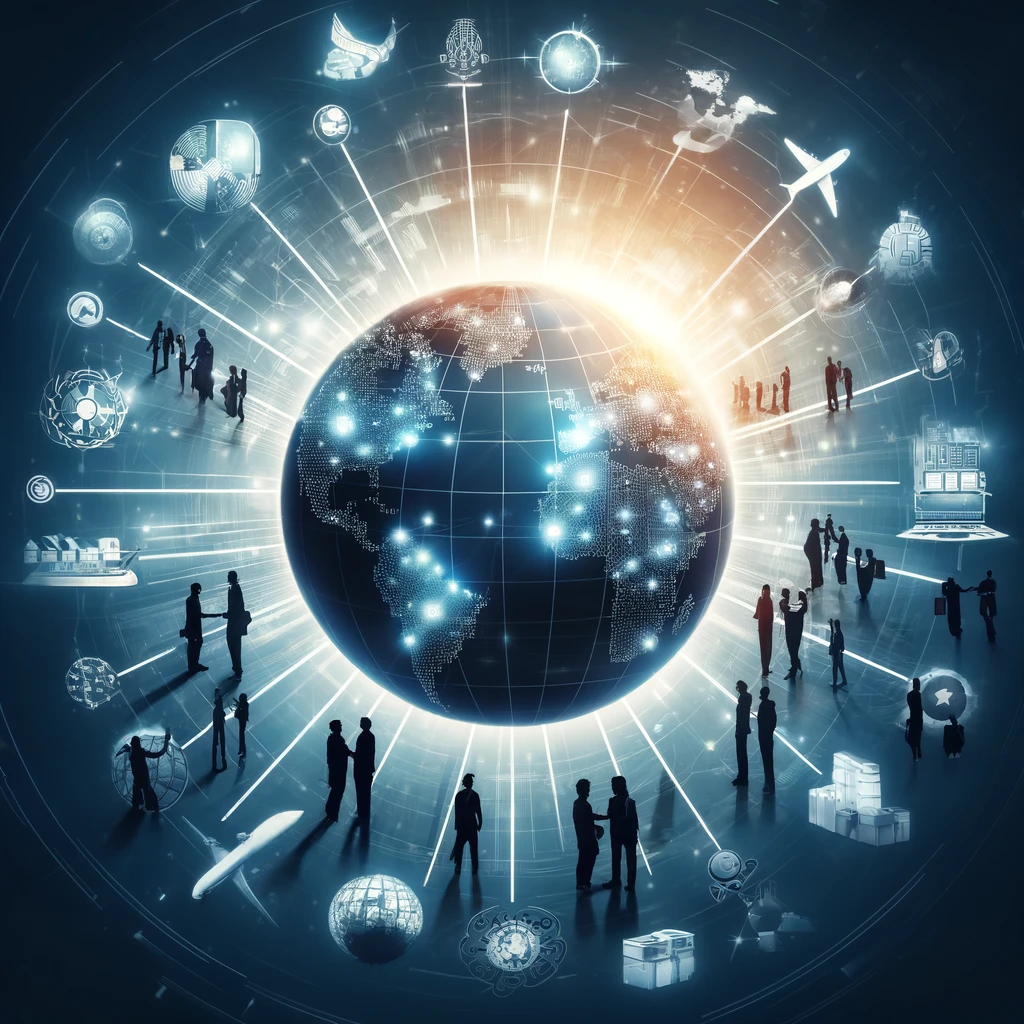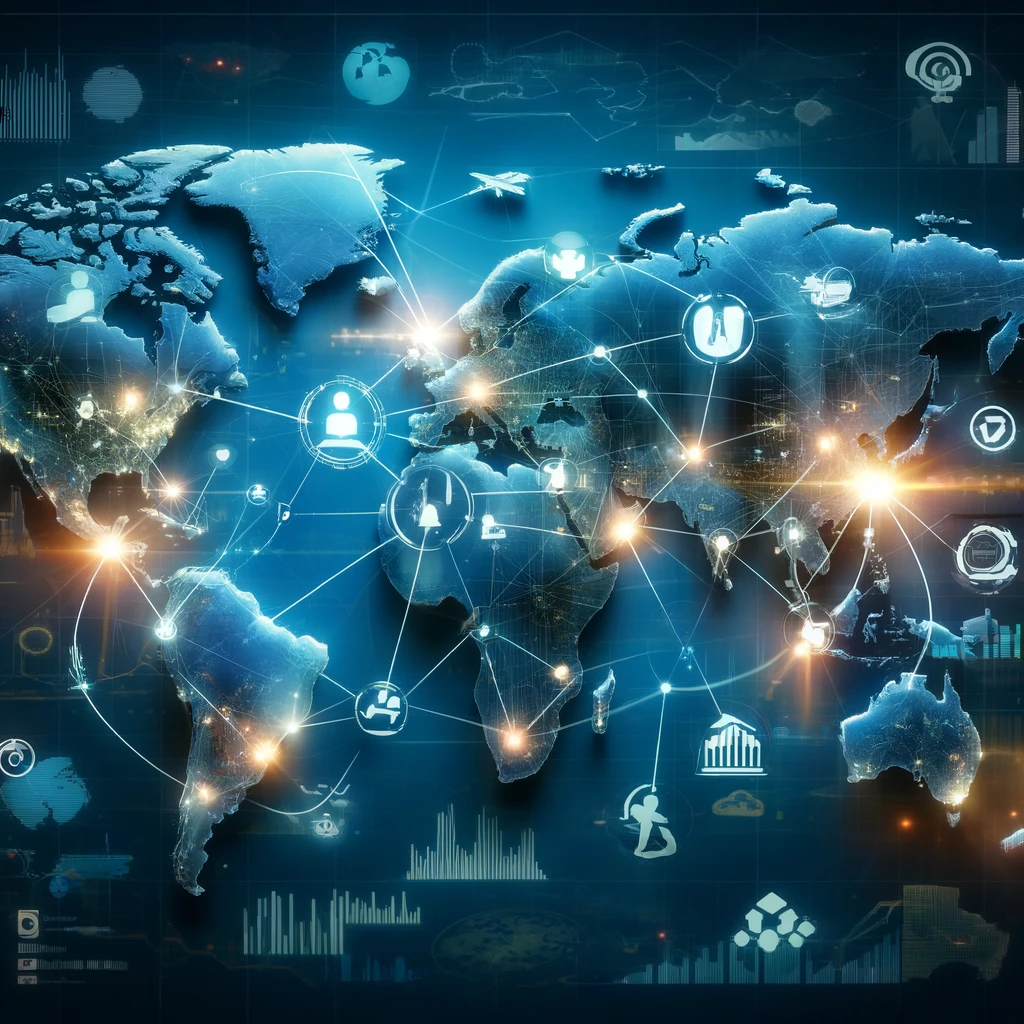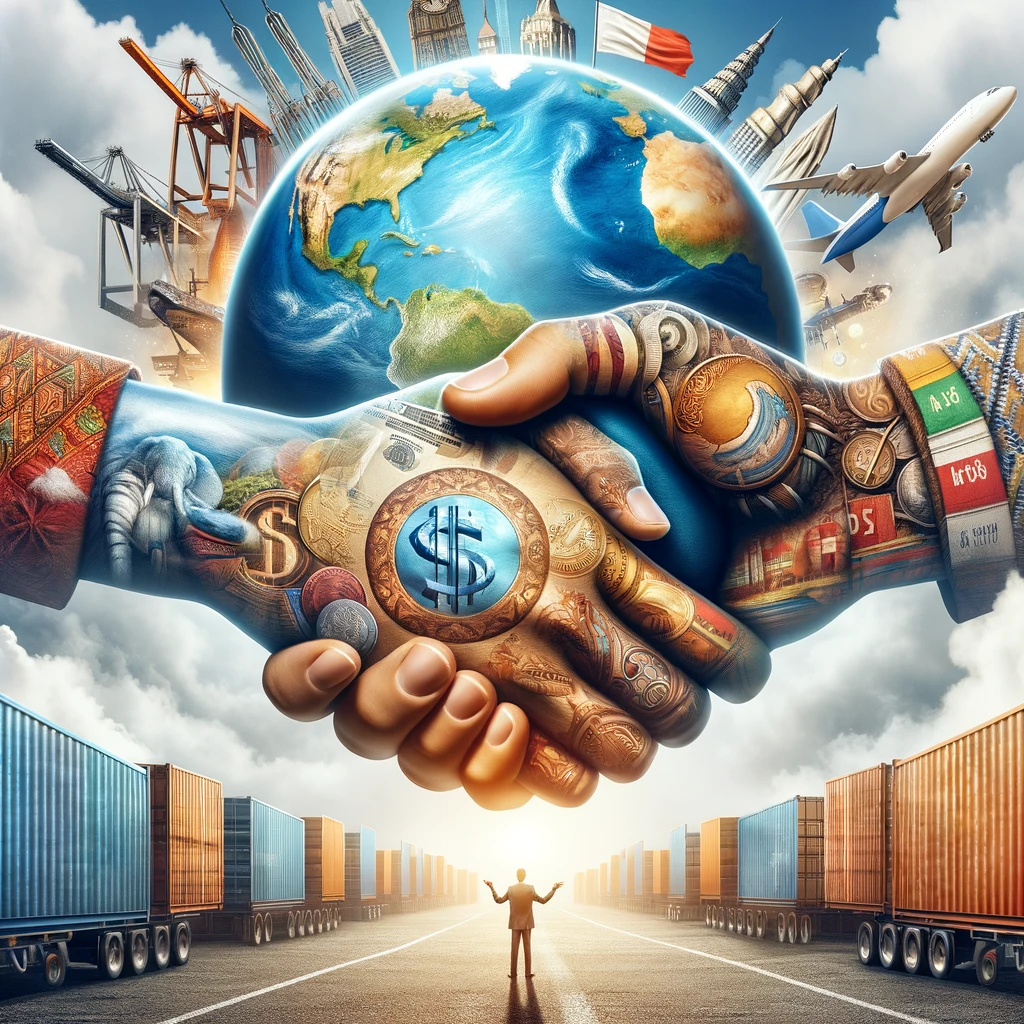Globalization
Definition
Globalization refers to the process by which businesses or other organizations develop international influence or start operating on an international scale.
Parts of Speech
- Noun
Pronunciation
American English
- IPA Pronunciation: /ˌɡloʊbələˈzeɪʃən/
- Respelling: GLOH-buh-luh-ZAY-shuhn (with "GLOH" as in "glow," "buh" as in "but," "luh" as in "sofa," "ZAY" as in "say," and "shuhn" as in "nation")
British English
- IPA Pronunciation: /ˌɡləʊbəlaɪˈzeɪʃən/
- Respelling: GLOH-buh-ly-ZAY-shuhn (with "GLOH" as in "glow," "buh" as in "but," "ly" as in "lie," "ZAY" as in "say," and "shuhn" as in "nation")
In both dialects, "globalization" places the primary stress on the fourth syllable, "ZAY." The pronunciation is similar across both American and British English, focusing on the clear articulation of "GLOH-buh-luh-ZAY-shuhn" in American English and "GLOH-buh-ly-ZAY-shuhn" in British English.
Etymology
The term "globalization" stems from the word "global", which is derived from the Old French globe, referring to a spherical object, and the Latin globus, meaning "sphere". The suffix "-ization" indicates the process of making or becoming, reflecting the idea of the world becoming more interconnected.
Derivatives
- Globalize (verb)
- Globalized (adjective)
- Globalizing (verb, present participle)
- Global (adjective)
- Globalism (noun)
Synonyms
- Internationalization
- Universalization
- World integration
Antonyms
- Localization
- Insularity
- Nationalism
Usage
Globalization is a multi-faceted process that affects various aspects of society, including trade, communication, culture, and politics. It is often associated with the spread of technology, the rise of multinational corporations, and the increasing influence of international institutions. The term is frequently discussed in economics, sociology, and political science, and is a key concept in understanding modern global dynamics.
Related Terms
- Trade liberalization
- Multinational corporations
- Outsourcing
- Interconnectedness
- Cultural diffusion
Detailed Definition
Noun
- Integration of Markets: The expansion and intensification of international trade, investment, and financial markets, leading to a more interconnected global economy.
- Example: The globalization of the economy has led to increased competition and innovation.
- Spread of Ideas and Cultures: The exchange and assimilation of cultural elements, such as music, food, fashion, and values, across different societies.
- Example: Globalization has introduced diverse cuisines to new regions, enriching local cultures.
- International Cooperation and Governance: The development of international norms, regulations, and institutions that govern global interactions and address transnational issues.
- Example: The globalization of environmental policy has led to international agreements on climate change.
globalization



🇨🇳 Mandarin
- 全球化 (Quánqiú huà)
- IPA: [tʂʰɥɛ́n.tɕʰjóʊ xwâ]
- Respell: Quan-qiu hua
- 全球化进程 (Quánqiú huà jìnchéng)
- IPA: [tʂʰɥɛ́n.tɕʰjóʊ xwâ tɕîn.tʂʰə̌ŋ]
- Respell: Quan-qiu hua jin-cheng
🇮🇳 Hindi
- वैश्वीकरण (Vaishvīkaraṇ)
- IPA: [ʋaɪʃʋiːkəɾəɳ]
- Respell: Va-ish-vi-ka-ran
- ग्लोबलाइज़ेशन (Globalāizaśan)
- IPA: [ɡloːbəlaːizaːʃən]
- Respell: Glo-ba-la-iza-shan
🇪🇸 Spanish
- Globalización
- IPA: [ɡloβaliθaˈθjon]
- Respell: Glo-ba-li-za-cion
- Mundialización
- IPA: [mundjaˈlisaˈθjon]
- Respell: Mun-di-a-li-za-cion
🇫🇷 French
- Mondialisation
- IPA: [mɔ̃djaliˈzaːsjɔ̃]
- Respell: Mon-di-ali-za-tion
- Globalisation
- IPA: [ɡlɔbalizaˈsjɔ̃]
- Respell: Glo-ba-li-za-tion
🇸🇦 Modern Standard Arabic
- العولمة (Al-'awlama)
- IPA: [alˌʕawlaˈma]
- Respell: Al-aw-la-ma
- عولمة (‘Awlama)
- IPA: [ˈʕawlama]
- Respell: Aw-la-ma
🇧🇩 Bengali
- বৈশ্বিকীকরণ (Bishbikīkaraṇ)
- IPA: [bɔiʃbikiːkɔrɔn]
- Respell: Boi-sh-bi-ki-ka-ron
- গ্লোবালাইজেশন (Globalaiześan)
- IPA: [ɡloːbalaiʒeʃɔn]
- Respell: Glo-ba-lai-ze-shan
🇷🇺 Russian
- Глобализация (Globalizatsiya)
- IPA: [ɡləbəlʲɪˈzatsɨjə]
- Respell: Glo-ba-li-za-tsi-ya
- Мировое взаимодействие (Mirovoye vzaimodeystviye)
- IPA: [mʲɪrɐˈvojə vzɐɪmədʲɪjˈstvʲɪjə]
- Respell: Mi-ro-voye vza-i-mo-deyst-vi-ye
🇵🇹 Portuguese
- Globalização
- IPA: [ɡlobɐliˈzaˈsɐ̃w]
- Respell: Glo-ba-li-za-são
- Mundialização
- IPA: [mundʒɐliˈzaˈsɐ̃w]
- Respell: Mun-di-a-li-za-são
🇮🇩 Indonesian
- Globalisasi
- IPA: [ɡlobaˈlisaʃi]
- Respell: Glo-ba-li-sa-si
- Pembumian
- IPA: [pəmbuˈmian]
- Respell: Pem-bu-mi-an
🇩🇪 German
- Globalisierung
- IPA: [ɡloˈbaːliziːʁʊŋ]
- Respell: Glo-ba-li-sie-rung
- Weltweite Integration
- IPA: [ˈvɛltˌvaɪ̯tə ɪntɛɡʁaˈtsi̯oːn]
- Respell: Welt-wei-te In-te-gra-tion
🇯🇵 Japanese
- グローバル化 (Gurōbaru-ka)
- IPA: [ɡɯɾoːbaɾɯka]
- Respell: Gu-ro-ba-ru-ka
- 世界化 (Sekaika)
- IPA: [sekaɪka]
- Respell: Se-ka-i-ka
🇻🇳 Vietnamese
- Toàn cầu hóa
- IPA: [twaːn kəw hwaː]
- Respell: Twan kau hwa
- Hội nhập toàn cầu
- IPA: [hɔj ɲaːp twaːn kəw]
- Respell: Hoy nyap twan kau
🇰🇷 Korean
- 세계화 (Segyehwa)
- IPA: [se.ɡje.hwa]
- Respell: Se-gye-hwa
- 글로벌화 (Geullobeolhwa)
- IPA: [ɡɯl.lo.bʌl.hwa]
- Respell: Geul-lo-beol-hwa
🇹🇷 Turkish
- Küreselleşme
- IPA: [kyɾeˈselleʃme]
- Respell: Ku-re-sel-leş-me
- Dünya çapında yayılma
- IPA: [dʏnja t͡ʃaˈpɯnda jaˈjɯlma]
- Respell: Dun-ya cha-pin-da ya-yil-ma
🇵🇰 Urdu
- عالمگیریت (Aalmgeeriyat)
- IPA: [ɑːləmɡɪˈriːjət]
- Respell: Aa-lam-gee-ri-yat
- گلوبلائزیشن (Globalaizēśan)
- IPA: [ɡloːbəlaːɪzeːʃən]
- Respell: Glo-ba-lai-ze-shan





